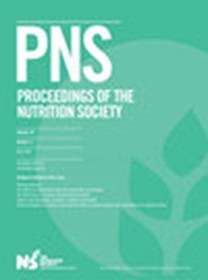2018年WCRF/AICR癌症预防建议的遵守情况与癌症风险之间的关系是否受多病情况的影响?英国生物库前瞻性队列研究结果
IF 7.6
2区 医学
Q1 NUTRITION & DIETETICS
引用次数: 0
摘要
在英国,约 40% 的癌症可归因于可改变的生活方式风险因素,如超重、肥胖和低膳食纤维摄入量(1)。世界癌症研究基金会(WCRF)和美国癌症研究协会(AICR)发布了十项基于生活方式的癌症预防建议,旨在降低癌症和其他非传染性疾病的发病风险(2)。在英国生物库队列中,我们发现,更严格遵守这些防癌建议(即更健康的生活方式)可降低总体癌症风险以及乳腺癌和结直肠癌风险。本研究旨在调查这些关联的程度是否会因基线时存在糖尿病和心血管疾病等并发症而有所改变。我们使用了英国生物库前瞻性队列研究中94778名参与者(53%为女性,平均年龄56岁)的数据,这些参与者在2006年至2010年间被招募,基线时未患癌症。根据饮食、体力活动和身体成分数据,采用标准化评分(3)计算出2018年WCRF/AICR癌症预防建议的遵守情况。多病症(43 种慢性病清单)在基线时进行自我报告,并分为 0、1、2 或 3 类:0、1、2 或 3+ 种慢性病。英格兰和威尔士的癌症发病病例通过截至 2019 年 7 月的人口癌症登记处进行确认,苏格兰的癌症发病病例通过截至 2015 年 10 月的人口癌症登记处进行确认。参与者被分为近似分数三等分,最低的三等分(最低依从性,0-3.5 分)作为参考类别。在调整混杂因素后,采用 Cox 比例危险模型研究总分与癌症发病率之间的关系,并检验总分与多病之间的交互作用。55,191 名参与者(58%)在基线时患有一种慢性病,8,430 名参与者(9%)患有≥3 种慢性病。2018年WCRF/AICR平均总分为3.8分(SD 1.0),存在慢性疾病的参与者总分明显较低(≥3种疾病的参与者平均分为3.58分,无慢性疾病的参与者平均分为3.96分,P<0.001)。在中位 8 年的随访期间,有 3303 人罹患癌症。在调查总分与癌症风险之间的关系时,总分与多病症之间存在显著的交互作用(交互作用的 HR:1.59,p=0.002)。还有证据表明,总分和多病症与乳腺癌风险之间存在交互作用(交互作用 HR:1.23,p=0.030),但没有证据表明总分和多病症与结直肠癌风险之间存在交互作用。这表明,更严格遵守2018年WCRF/AICR癌症预防建议的化学保护作用可能对患有多种疾病的人特别有益。本文章由计算机程序翻译,如有差异,请以英文原文为准。
Are associations between adherence to the 2018 WCRF/AICR cancer prevention recommendations and risk of cancers modulated by multimorbidity? Findings from the UK Biobank prospective cohort study
Approximately 40% of cancers in the UK are attributable to modifiable, lifestyle risk factors such as overweight and obesity and low dietary fibre intake(1) . The WCRF and AICR published ten lifestyle- based Cancer Prevention Recommendations with the aim of reducing the risk of cancer and other non-communicable diseases(2) . In the UK Biobank cohort, we have found reduced risk of cancer overall and of breast and colorectal cancers with greater adherence to these Cancer Prevention Recommendations (i.e., healthier lifestyles). The present study aimed to investigate whether the magnitude of these associations is modified by the presence of co-morbidities, such as diabetes and cardiovascular disease, at baseline.We used data from 94,778 participants (53% female, mean age 56 years) from the UK Biobank prospective cohort study, recruited between 2006 and 2010 and free from cancer at baseline. Adherence to the 2018 WCRF/AICR Cancer Prevention Recommendations was calculated from dietary, physical activity, and body composition data using a standardised score(3) . Multimorbidity (list of 43 chronic diseases) was self-reported at baseline and categorised into: 0, 1, 2, or 3+ chronic illnesses. Incident cancer cases were identified using population-based cancer registries available until July 2019 for England and Wales and October 2015 for Scotland. Participants were categorised into approximate score tertiles, and the lowest tertile (lowest adherence, 0-3.5 points) was used as the reference category. Cox proportional hazard models were used to investigate associations between total score and incidence of cancer, adjusting for confounders, and to test for an interaction between total score and multimorbidity.55,191 (58%) participants had one chronic illness at baseline and 8,430 (9%) had ≥3. Mean total 2018 WCRF/AICR score was 3.8 (SD 1.0) points, and participants with the presence of chronic illnesses had a significantly lower total score (mean for ≥3 illnesses = 3.58 points vs 3.96 points for participants without chronic illness, p<0.001). During a median follow-up of 8 years, 3,303 individuals developed cancer. When investigating associations between score tertiles and the risk of cancer overall, there was a significant interaction between the total score and multimorbidity (HR for interaction: 1.59, p=0.002). There was also evidence for an interaction between total score and multimorbidity with breast cancer risk (HR for interaction: 1.23, p=0.030), but no evidence of an interaction between total score and multimorbidity for risk of colorectal cancer.We found stronger associations between total adherence score and the risk of cancer in participants with ≥3 chronic illnesses. This suggests that the chemoprotective effects of greater adherence to the 2018 WCRF/AICR Cancer Prevention Recommendations may be particularly beneficial for individuals with multimorbidity.
求助全文
通过发布文献求助,成功后即可免费获取论文全文。
去求助
来源期刊
CiteScore
15.50
自引率
0.00%
发文量
190
审稿时长
6-12 weeks
期刊介绍:
Proceedings of the Nutrition Society publishes papers and abstracts presented by members and invited speakers at the scientific meetings of The Nutrition Society. The journal provides an invaluable record of the scientific research currently being undertaken, contributing to ''the scientific study of nutrition and its application to the maintenance of human and animal health.'' The journal is of interest to academics, researchers and clinical practice workers in both human and animal nutrition and related fields.

 求助内容:
求助内容: 应助结果提醒方式:
应助结果提醒方式:


